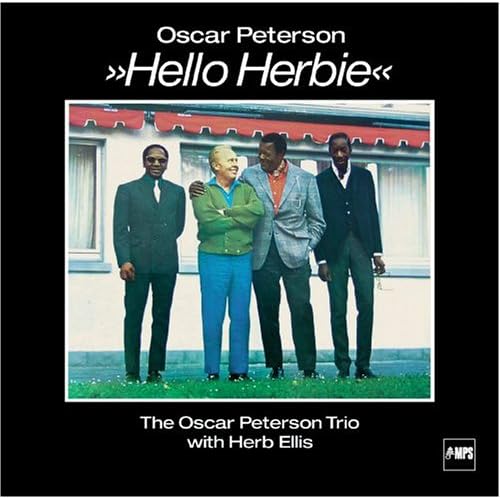 Oscar Peterson with Herb Ellis - "Hello, Herbie".....Cd.....Samples...
Oscar Peterson with Herb Ellis - "Hello, Herbie".....Cd.....Samples... This 1969 Oscar Peterson date finds guitarist Herb Ellis sitting in with the pianist and his rhythm section (bassist Sam Jones and drummer Bobby Durham) for a gloriously stretched-out session. Many of the compositions are based on simple blues progressions, but the sense of cool swing and bop pyrotechnics from Ellis and Peterson approximates the magic the two leaders shared together in the '50s (when Ellis was the regular guitarist for Peterson's then-bassless trio).
"Recorded by Hans Georg Brunner-Schwer in his private studio at Villingen"
If I mention humor, it’s good humor. There’s a scene in Jazzin’ the Black Forest in which some elderly ladies immediately recognise a strange contraption on a table. It’s the forgotten invention from the SABA electronics firm which at last allowed recorded music to be played in a moving car! A tape cassette player, sure enough! The cassette, however, was about as big as a VCR tape.
After that scene in this mostly German language television film with English subtitles, the plot continues along as a shade scatty, but simultaneously becoming more interesting. Hans Georg Brunner-Schwer, who was co-proprietor with his brothers of the big electronics firm SABA (with their mother still presiding), had the bright idea of consulting people who would be useful, nay necessary, if SABA followed his idea of providing music to be played on this odd apparatus.
It’s an old story. For example, makers of bicycles also made gramophones, and then the records to play on them. The late record producer John Culshaw had to battle some Swiss bicycle manufacturers before his employer, Decca, would sign on a young tenor called Pavarotti. (Actually, Culshaw lost; Decca signed Pavarotti only because one of their stars wanted to record with him.) Unlike the average bike-builders, Brunner-Schwer knew his music – especially jazz music. Unlike Culshaw, he was a partner in the firm, and had his own millions to spend when the family refused to back his idea. With both love for jazz and the money to back it, he started up MPS (Music Production Schwarzwald).
Brunner-Schwer invited Oscar Peterson to his large house in Germany in the Black Forest near the Swiss border (Schwarzwald),a landscape of meadow, mountain and trees, so that Peterson could audition him. Would MPS be worthy to succeed Norman Granz’s Verve as the company that recorded the Peterson trio?
Prior to this meeting, Peterson and his band played in Zürich, and a worried Brunner-Schwer heard over the phone that Peterson was on his fifth encore. After the concert, they were due at a party, then record date, in Brunner-Schwer’s mansion. The party atmosphere in the mansion drooped as Peterson’s arrival was delayed, and more booze than predicted flowed into guests.
Eventually, the Peterson trio arrived, were regaled and refreshed, and Oscar sat at Brunner-Schwer’s stupendous Steinway while Brunner-Schwer manned the recording console in his attic. Peterson climbed to the attic to give the device a listen while Brunner-Schwer sweated in sight of Peterson’s paralysed face. Suddenly Peterson said, “That doesn’t sound like a recording of a piano! It sounds like a piano!”
Soon thereafter, Peterson fans around the world knew Peterson’s sentiments that after a quarter-century of having his music recoredd, he had at last begun to make the real recordings he’d always wanted to, thanks to Brunner-Schwer’s recording device.